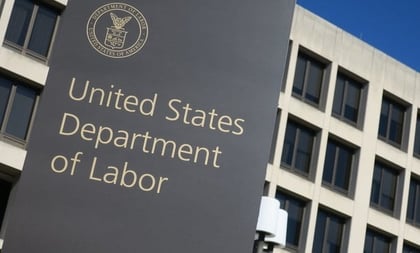 Representing a new domain for its enforcement arm, Labor is investigating trust companies that are setting up collective investment trusts for sponsors. (Photo: Mike Scarcella/ALM)
Representing a new domain for its enforcement arm, Labor is investigating trust companies that are setting up collective investment trusts for sponsors. (Photo: Mike Scarcella/ALM)
Conventional wisdom would hold that regulators with enforcement jurisdiction over retail and institutional investment markets would loosen their grip under a pro-business, Republican presidential administration.
But attorneys with Drinker, Biddle and Reath report that both the Labor Department and Securities and Exchange Commission are leveraging enforcement initiatives at a historic level of tenacity.
“Now that the fiduciary rule has been terminated, I think the focus at DOL is more on enforcement,” said Fred Reish, a partner at Drinker Biddle and chair of the firm’s Financial Services ERISA Team.
“There’s been a realization over the years that in the 401(k) world, service providers play critical roles in the operation of plans, unlike with defined benefit plans, where everything happened in-house,” added Reish.
One recent Labor investigation of a registered investment advisory firm that Reish defended focused on the RIA’s relationship with the custodian of the assets. The RIA in question actively managed a retirement plan’s assets, which were placed with the custodian without fees charged to plan participants. But the RIA and custodian had a revenue sharing agreement. Labor’s investigation found that to be a prohibited transaction under ERISA.
In other cases, Labor is investigating trust companies that are setting up collective investment trusts for sponsors. Reish said such investigations represent a new domain for Labor’s enforcement arm. “We are seeing a more focused investigation regiment,” said Reish.
“They start with ‘hello, we are the DOL, show us how you do ERISA,’ and from there take a very broad based approach,” said Brad Campbell, a partner in Drinker Biddle’s Washington D.C. office.
In a webinar, Campbell said he too is defending several plan service providers in DOL investigations.
“We would expect them to look into proper disclosures, but they are getting into more complex interpretations that reflects some of the experience they gained throughout the fiduciary rule process,” said Campbell.
Complicating matters is that the newfound experience with internal industry mechanics is grasped at varying levels among Labor’s exam and enforcement teams. ERISA’s complex provisions and exemptions “are not universally understood” among examiners, said Campbell.
“Just because DOL has asserted a breach doesn’t mean there was one,” he added.
In one investigation of a broker dealer, front-end sales loads were collected when they could have been waived for charitable organizations.
The SEC referred the case to Finra and Labor, meaning the broker dealer was subject to two investigations at once, something Reish thinks was inappropriate.
Labor was asked to defer to Finra, but they would not concede. “It’s the first time I’ve seen DOL take a position on share classes in an investigation of a broker dealer,” said Reish.
Hundreds of RIAs self-report under SEC’s disclosure initiative
Last February, the SEC launched the Share Class Selection Disclosure Initiative, which was intended to rein in potentially widespread violations of the Investment Advisors Act of 1940.









 October 26, 2018 at 05:01 PM
October 26, 2018 at 05:01 PM











